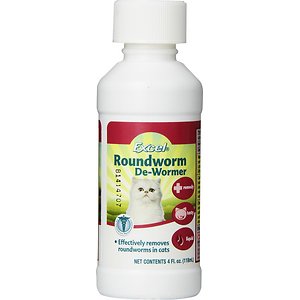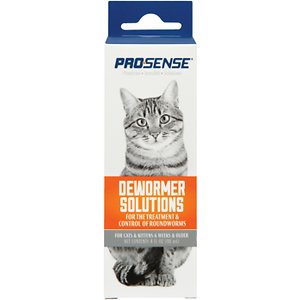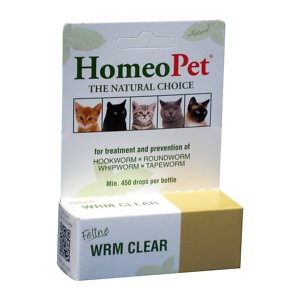Worm infestations in cats can lead to some pretty scary health complications. There are plenty of ways for cats to contract parasites. Thankfully there are plenty of ways to treat them.
The best dewormer for you is one that specifically targets the type of worms affecting your cat. In many cases, a single active ingredient is enough to tackle two or more worm types. The best cat dewormer is Bayer’s Tapeworm Dewormer for its fast-acting, reliable ingredients.
If your cat is suffering from roundworms, hookworms, or other types of worm infestations, read on to find effective dewormers for all kinds of different worms.
Below is a list of the best over the counter cat dewormers that are highly effective in removing all kinds of worms.
- 1 The Best Cat Dewormers
- 1.1 1. Bayer Tapeworm Dewormer — Best Tapeworm Dewormer
- 1.2 2. Bayer Drontal Broad Spectrum Dewormer — Best All Round Dewormer
- 1.3 3. Excel Roundworm Liquid Cat Dewormer — Best Roundworm Dewormer
- 1.4 4. ProSense Liquid Roundworm Dewormer — Best Budget Roundworm Dewormer
- 1.5 5. HomeoPet WRM Clear Dewormer — Best Natural Dewormer
- 2 A Guide To Choosing Effective Cat Dewormers
- 2.1 Types of Intestinal Parasites
- 2.1.1 Tapeworms
- 2.1.2 Roundworms
- 2.1.3 Hookworms
- 2.2 Treatment Options
- 2.3 Preventing Worms
- 2.4 Conclusion
- 2.1 Types of Intestinal Parasites
The Best Cat Dewormers
1. Bayer Tapeworm Dewormer — Best Tapeworm Dewormer
For cats over six weeks of age, look no further. These tablets are the best tapeworm deworming tablets available right now. Bayer has long been a trusted brand for helping humans and pets alike. Their Tapeworm Dewormer formula consistently takes care of the problem within 24 hours.
If your cat has a tapeworm infestation, and this dewormer is suitable for your cat (age, allergies, etc), then I’d recommend you try this dewormer before any others. It really is very effective at deworming cats and is likely to deal with the worms quickly and in one single dosage.
The package contains three tablets, each containing 23mg of the active ingredient praziquantel. The active ingredient gets to work in under an hour in most cases, and within 24 hours will have left your cats system along with any tapeworms.
Read the dosage instructions carefully, cats under 4lbs require only half a tablet, and one dose is enough to deal with a single infestation.
Despite its higher price tag, in most cases, you’ll be left with a tablet or two spares in case the infestation reoccurs. Less effective but cheaper solutions offer a bit of a false economy, as you’ll most likely wish you’d bought this dewormer first.
2. Bayer Drontal Broad Spectrum Dewormer — Best All Round Dewormer
Dealing with multiple infestations, or prefer a tablet that gives you peace of mind everything is covered? Bayer’s broad-spectrum dewormer is a perfect choice. Formulated to deal with tapeworms, hookworms, and roundworms, you can rest assured that all will be wiped out after a single dose.
Each tablet contains 18.2 mg praziquantel and 72.6 mg pyrantel as the active ingredients. This particular tub contains 50 doses; the bulk purchase makes it a far cheaper option for those who have multiple cats. In our experience, the shelf-life of the tablets is roughly two years from the purchase date.
3. Excel Roundworm Liquid Cat Dewormer — Best Roundworm Dewormer
Excel’s excellent roundworm liquid works to quickly remove roundworm infestations through the use of the active ingredient piperazine citrate. A liquid application can be much easier to use than a tablet; adding a few droplets to your cats’ meals is much less conspicuous than trying to hide pills in their food.
We’re yet to have trouble with our own cats when using liquid deworming solutions. The recommended dosage is a 1/4 teaspoon for each 2.5lbs of body weight. Excel recommends two dosages, a fortnight apart, then a further dose every 30 days to prevent reinfestation. It’s suitable for cats over six weeks of age, but not for pregnant or nursing cats.
4. ProSense Liquid Roundworm Dewormer — Best Budget Roundworm Dewormer
ProSense’s liquid roundworm dewormer is super effective and extremely affordable. We’ve picked a 4oz bottle up at under $5 in the past, and were amazed by the effectiveness of such an affordable solution.
It uses piperazine citrate as the active ingredient, making it suitable for cats over six weeks of age. This is the best dewormer for cats with roundworms, and for owners who would rather not shell out on Bayer Drontal’s Broad Spectrum Deworming solution.
Liquid solutions are lovely for administering with ease and allow for small droplets to be added to food regularly to avoid reinfestation. All in all, our personal experiences with this dewormer have been nothing short of excellent; we’d highly recommend it as both a treatment and as a preventative measure. Very impressive and very cheap!
5. HomeoPet WRM Clear Dewormer — Best Natural Dewormer
HomeoPet’s WRM dewormer takes a different approach to dealing with worms of all types. Rather than using a drug-approach to kill worms, it works using natural ingredients to create an environment they cannot live in. By creating an environment where worms can’t survive, they are flushed from your cats’ system without the need to use potentially harsh ingredients.
Because HomeoPet’s formula has only naturally occurring ingredients, it’s suitable for cats of all ages and dispositions. We’d recommend this effective formula for cats who for some reason or other can’t use one of the chemical-based dewormers.
A Guide To Choosing Effective Cat Dewormers
Unfortunately, intestinal parasites are common in cats throughout the world. Regardless of whether your cat stays indoors or ventures outdoors, you’re likely to have encountered worms in the past. When this happens, you can go to your veterinarian and receive a prescription for a cat wormer.
This is always the best way to go if the infestation is serious.
A mild infestation can often be treated at home with an over the counter product.
Types of Intestinal Parasites

Getting the best dewormer for your cat requires figuring out what type of worms they have. The three most common ones in the U.S. are:
Tapeworms
These infestations typically happen when your cat ingests a flea that is carrying tapeworm eggs. Once in your cat, the latch on to the intestines.
During the infestation, your cat is being robbed of nutrients it needs. It can eventually cause them to lose weight and become sickly. Tapeworms are very common when you are dealing with a large amount of fleas in your home.
You may see segments of the worm in your cat’s feces. It’s not uncommon to also notice your cat suffering from diarrhea and loss of appetite.
Roundworms
These are very common in cats and it’s important to catch and treat them early. Your cat usually gets this type of worm by eating roundworm eggs. The signs of a roundworm infestation include a bloated stomach, loss of appetite, and general weakness.
Hookworms
This scary type of parasite is commonly gotten through ingesting eggs. It can also be acquired by walking on soil contaminated with hookworms.
Hookworm is shed through feces and can spread from one cat to another through the use of a shared litter box. These are not visible to the eye, and so must be diagnosed by a veterinarian.
In the beginning, your cat may get lesions on the bottoms of their feet. You might also notice a loss of appetite, cough, diarrhea, or constipation. Early treatment is critical because hookworms can be fatal.
If you are not sure what type of worms your cat has consult with your veterinarian before starting any type of treatment.
There are products out there designed to treat all types of worms. They typically have a greater risk of side effects than those targeted at a specific type.
You can read more about the types of worms that infect cats here.
Treatment Options
There are two types of treatments available when you are treating your cat for worms. They are chemical and all-natural.
Chemical treatments can either be prescription or over the counter. Some of the best over the counter cat dewormers are as effective as prescription options.
The type of chemical treatment you need depends on the type of worms you are treating. Here are the most common chemicals used to rid your cat of worms:
- Pyrantel pamoate treats both roundworms and hookworms by paralyzing their bodies.
- Praziquantel is effective against tapeworms, it starves them until they eventually disintegrate.
- Piperazine works to paralyze roundworms so they can pass through your cat’s body.
If you opt for a natural treatment, Diatomaceous earth is the most common choice. It is also used to treat fleas and works by dehydrating the worms.
There is some debate around the effectiveness of Diatomaceous earth. Though natural treatments might seem more appealing, they are generally less effective.
When shopping for a dewormer, you should keep your cat’s safety in mind. Check out the potential side effects of any medication before giving it. If your cat is sick in any way or older it is best to consult your veterinarian before starting any treatment. Keep in mind that the treatment will only work if you can manage to get your cat to consume it.
It may be best to shop for a medication that can be given in their food. A pill-gun is a good investment for getting them to take their medication orally.
Almost all medications advise at least one follow up treatment to make sure the worms are gone for good.
Preventing Worms
It’s possible for your cat to have a worm infestation and not show any outward symptoms. This is the primary reason that routine vet visits and preventative measures are key.
Here are some of the best ways to keep your cat from getting worms in the first place:
- Keep your kitty indoors. Rodents, birds, and rabbits are all notorious carriers of worms. They are also things your cat is likely to hunt outdoors. It isn’t practical for all cat owners, but for those with young kittens it’s a choice worth debating.
- Test their feces. This is especially important if you allow your cat to roam outside. Once or twice a year, take a stool sample to your vet so they can test for parasites. This may be the only way to catch them if your cat is not showing symptoms.
- Use flea prevention. If your cat has fleas long enough, they will inevitably get tapeworms. By using a preventative flea treatment every month, you are protecting your cat from more than fleas.
- Stay clean. For a variety of reasons, it is important to maintain a clean-living space for your cat. This means regular litter box cleaning, keeping water fresh and washing their bowls daily.
- Keep your cat healthy. A good diet and overall health can help your cat fight off parasites. Make sure to feed your cat a high-quality food and talk to your veterinarian about any vitamins or supplements that may help them stay healthy.
Conclusion
Keeping your cat worm-free is part of keeping your cat healthy and happy. If preying on your cat wasn’t bad enough, some types of worms can actually spread to humans; all the more reason to keep diligent about prevention and treatment when necessary.
A good cat wormer does not necessarily have to come from a prescription. There are a variety of effective over-the-counter remedies on the market. They do require that you know what type of worm you are dealing with and are willing to do a little research.
Be sure to consult with your veterinarian if you ever feel unsure about the course of treatment you have selected.
Did you find this article helpful?





